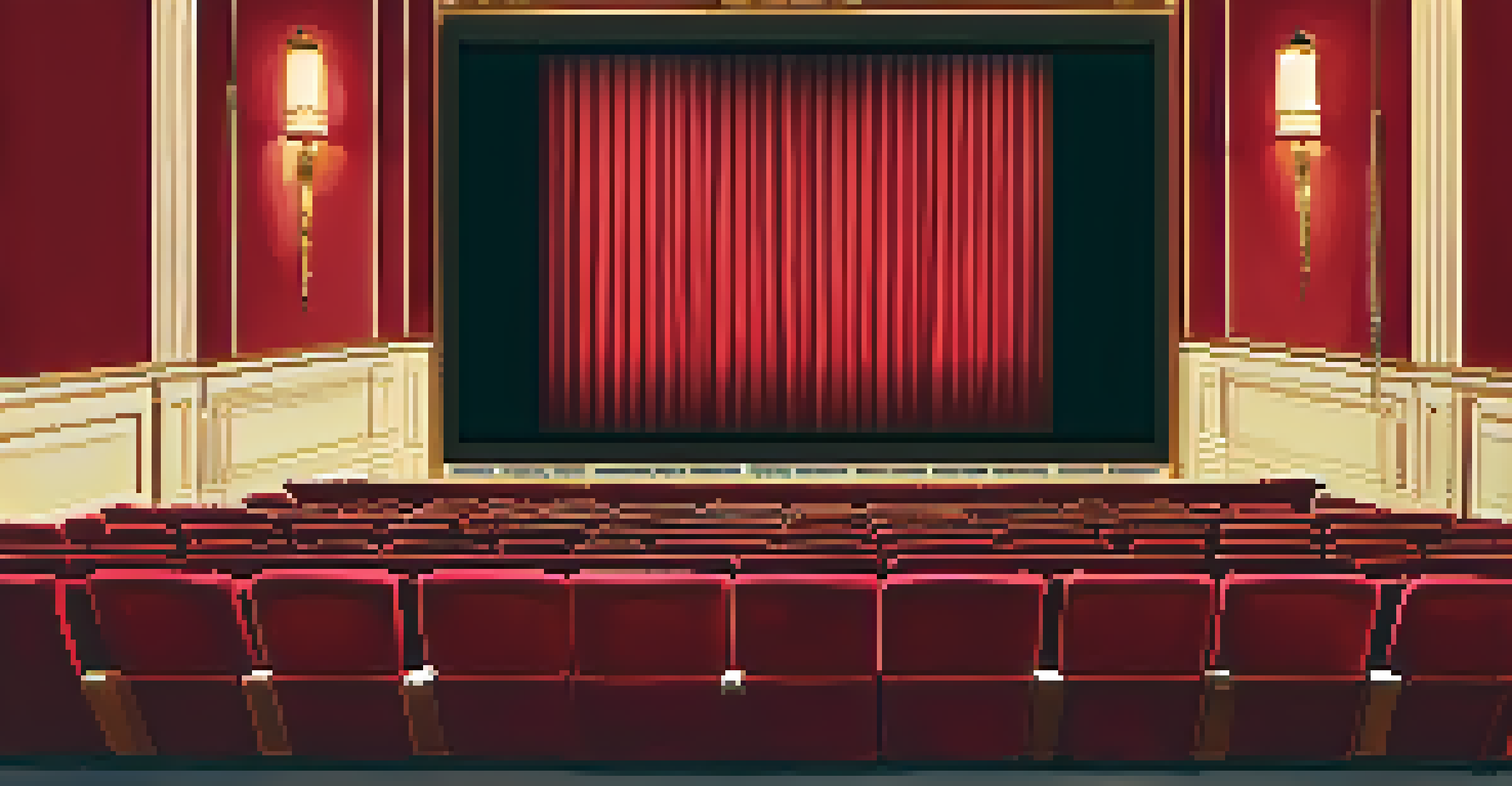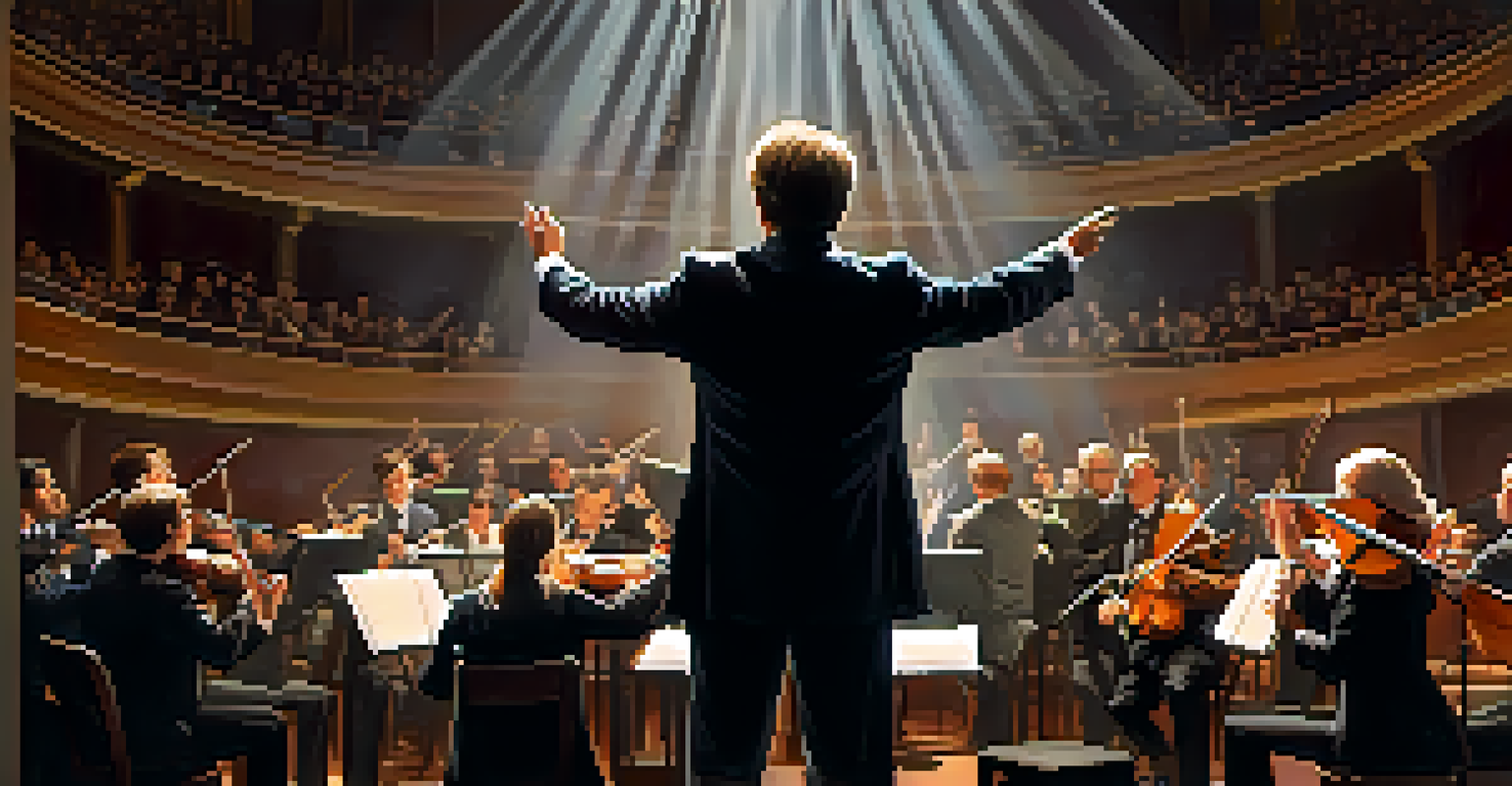The Impact of Film Music on Audience Emotions

Understanding the Role of Music in Film
Film music serves as an emotional guide, steering viewers through the narrative. It can heighten tension, evoke nostalgia, or create joy, depending on the scene's needs. Think about how a suspenseful score can make your heart race during a thrilling chase or how a soft melody can bring tears during a poignant moment.
Music can change the world because it can change people.
By using specific instruments or styles, composers create a unique soundscape that resonates with audiences on a deeper level. For instance, a haunting violin might signal danger, while a cheerful flute can suggest happiness. This intentional choice of sound helps to convey the film's emotional core without needing dialogue.
Ultimately, the music becomes a character in its own right, enhancing the storytelling experience. Just as a good actor brings depth to their role, effective music amplifies the emotional impact of a film, making it unforgettable.
The Psychological Effects of Film Music
Research shows that music can significantly affect our emotions and physiological responses. When we hear a particular score, our brains often connect that music to specific feelings, whether it's excitement or sadness. This psychological link is why we can feel chills during a dramatic moment, even if we don't consciously recognize the music's influence.

For example, think about the iconic 'Imperial March' from Star Wars. Many associate this powerful theme with the villain Darth Vader, causing an immediate emotional reaction when it plays. This association showcases how music can create a psychological framework that shapes our perception of characters and situations.
Music Shapes Film Narratives
Film music serves as an emotional guide that enhances storytelling by evoking specific feelings and reactions from the audience.
Moreover, film music can also impact our mood long after the movie ends. A memorable score can linger in our minds, reminding us of the emotions we experienced while watching, which is why film soundtracks often become so popular.
Creating Atmosphere Through Soundscapes
Film composers use soundscapes to create immersive worlds that pull viewers into the story. From the bustling streets of a city to the serene expanse of a forest, music plays a vital role in setting the atmosphere. A well-crafted soundscape can transport us to another place and time, enhancing our overall viewing experience.
The music is not in the notes, but in the silence between.
For instance, a tense horror film might use dissonant chords and eerie sounds to build an unsettling atmosphere. In contrast, a romantic comedy might employ light-hearted melodies to create a warm and inviting vibe. This strategic use of music ensures that the audience feels the intended emotions throughout the film.
Ultimately, these soundscapes help establish the film's tone, guiding viewers on an emotional journey. By skillfully blending music with visual elements, filmmakers craft a cohesive narrative that resonates long after the credits roll.
Emotional Cues: How Music Signals Feelings
Music in film often acts as an emotional cue, signaling the audience how to feel in a given moment. A shift in the score can indicate a change in mood, preparing viewers for what’s about to unfold. This technique allows filmmakers to manipulate emotions effectively, ensuring audiences are engaged and invested in the story.
For instance, a sudden crescendo in the music can instill a sense of urgency, while a gentle decrescendo might evoke feelings of relief or closure. This dynamic relationship between visuals and sound creates a powerful emotional experience that captivates viewers from start to finish.
Cultural Context Through Sound
Different musical styles and instruments provide cultural significance, enriching the narrative by connecting audiences to the film's setting.
By using these musical cues, filmmakers can subtly guide our emotional responses, making us laugh, cry, or gasp in shock. It’s a testament to the art of filmmaking, where every note plays a crucial role in enhancing the narrative.
Cultural Significance of Film Music
Film music often reflects the cultural backdrop of the story it accompanies, adding layers of meaning. Different genres, instruments, or styles can evoke specific cultural feelings, connecting audiences to the film's setting. This cultural significance enriches the viewing experience by providing context and depth to the narrative.
For example, a film set in India might incorporate traditional instruments like the sitar, creating an authentic atmosphere that resonates with the audience. Similarly, a western film might feature banjos and harmonicas to evoke the spirit of the American frontier. These choices help immerse viewers in the cultural nuances of the story.
Moreover, film music can also challenge or reinforce cultural stereotypes, shaping how audiences perceive different communities. By portraying diverse musical styles, filmmakers can promote understanding and appreciation of various cultures through their soundtracks.
Iconic Film Scores and Their Emotional Impact
Some film scores have become iconic due to their powerful emotional resonance. Think of John Williams' score for 'E.T.' or Hans Zimmer’s work on 'The Lion King.' These melodies are not just background music; they are integral to the story, evoking strong emotions that stay with viewers long after the film ends.
These scores often become synonymous with the films themselves, creating lasting memories for audiences. When we hear the opening notes, we are transported back to the emotions we felt while watching the film, evoking nostalgia and connection.
Emotional Engagement with Scores
Iconic film scores create lasting emotional connections, often becoming synonymous with the films and evoking nostalgia long after viewing.
Such iconic scores show how music can transcend the film medium, becoming part of our collective cultural experience. They remind us of the power of sound in storytelling, illustrating how film music can shape our emotions in profound ways.
The Future of Film Music and Emotional Engagement
As technology evolves, so does the way film music is created and experienced. With advancements in sound design and recording techniques, composers can explore new dimensions of emotional engagement. This evolution opens up exciting possibilities for how music can enhance storytelling in the future.
For example, virtual reality films might incorporate interactive soundscapes, allowing viewers to experience music in a more immersive way. Imagine being able to influence the score based on your emotional state, creating a personalized emotional journey through the film.

The future of film music holds incredible potential for deeper emotional connections, as composers continue to innovate and push the boundaries of sound. As audiences, we can look forward to more engaging and unforgettable experiences that resonate with our emotions in ways we have yet to imagine.